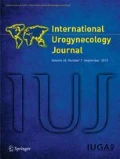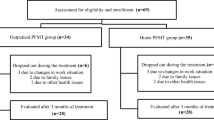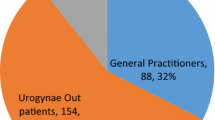Abstract
Introduction and hypothesis
To determine the feasibility of using the pelvic toner device (PTD) in aiding pelvic floor muscle training (PFMT)
Methods
Forty women, aged at least 18 years with symptoms of pure stress urinary incontinence (SUI) or stress-predominant mixed urinary incontinence were randomly assigned to standard PFMT (ST group), or to PFMT and additional PTD (PTD group). They were evaluated throughout a treatment period of 16 weeks, and followed up 6 months after the active treatment period, using International Consultation on Incontinence Questionnaires (ICIQ), bladder diaries, and other subjective outcome measures for symptom improvement.
Results
Twenty-four women were randomised to ST and 28 to PTD. Twelve women did not complete therapy and analysis was performed on 19 randomised to ST and 21 randomised to PTD on a per protocol basis. The two groups showed statistically significant symptom improvement in ICIQ responses, both at 16 weeks and at 6 months. There was no significant difference between the groups regarding improvement in SUI (ST 52.6 %, PTD 52.4 %) at 16 weeks. At 6 months after the active treatment period, 60 % of women (50 %, 8 in the PTD group and 71.4 %, 10 in the ST group) were still doing pelvic floor exercises. The sample difference observed was not statistically significant. Some women reported that the device helped with confidence that the correct muscles were being contracted, and helped motivation to sustain PFMT.
Conclusions
This pilot study demonstrates the feasibility of PTD for aiding PFMT. It is a safe and well-tolerated adjunct in PFMT, which increases patient choice.



Similar content being viewed by others
Notes
ICIQ-FLUTS 11a) Does urine leak when you are physically active, exert yourself, cough or sneeze? Response: Never, occasionally, sometimes, most of the time, all of the time.
References
Milsom I (2009) Lower urinary tract symptoms in women. Curr Opin Urol 19:337–341
Kegel AH (1948) Progressive resistance exercise in the functional restoration of the perineal muscles. Am J Obstet Gynecol 56:238–248
Dumoulin C, Hay-Smith J (2010) Pelvic floor muscle training versus no treatment, or inactive control treatments, for urinary incontinence in women. Cochrane Database Syst Rev (1):CD005654. doi:10.1002/14651858.CD005654.pub2
NICE (2006) Urinary incontinence: the management of urinary incontinence in women. National Institute for Health and Clinical Excellence Clinical Guideline 40: http://www.nice.org.uk/nicemedia/pdf/word/CG40quickrefguide1006.pdf
Herderschee R, Hay-Smith EJC, Herbison GP, Roovers JP, HeinemanMJ (2011) Feedback or biofeedback to augment pelvic floor muscle training for urinary incontinence in women. Cochrane Database Syst Rev (7):CD009252. doi:10.1002/14651858.CD009252
Herbison GP, Dean N (2002) Weighted vaginal cones for urinary incontinence. Cochrane Database Syst Rev (1):CD002114. doi:10.1002/14651858.CD002114
Ferguson KL, McKey PL, Bishop KR, Kloen P, Verheul JB, Dougherty MC (1990) Stress urinary incontinence: effect of pelvic muscle exercise. Obstet Gynecol 75:671–675
Acknowledgements
The authors would like to thank all the women who took part in the study.
Conflicts of interest
Funding was via an unrestricted grant from Solution Project Management, UK. The design, data collection, analysis and writing up were independently undertaken by the investigators, with no corporate input.
Author information
Authors and Affiliations
Corresponding author
Rights and permissions
About this article
Cite this article
Delgado, D., White, P., Trochez, R. et al. A pilot randomised controlled trial of the pelvic toner device in female stress urinary incontinence. Int Urogynecol J 24, 1739–1745 (2013). https://doi.org/10.1007/s00192-013-2107-x
Received:
Accepted:
Published:
Issue Date:
DOI: https://doi.org/10.1007/s00192-013-2107-x




